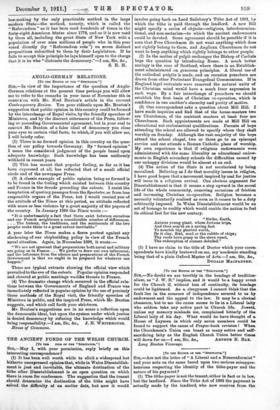THE ANCIENT FUNDS OF THE WELSH CHURCH.
[TO THE ITOR OF THE " SPECTATOR:1
SIR,—May I, with your permission, reply briefly on this interesting correspondence
(1) It has been well worth while to elicit a widespread but hitherto unexpressed opinion that, while in Wales Disestablish- ment is just and inevitable, the ultimate destination of the tithe after Disestablishment is an open question on which there is room for conference. The suggestion that the tenant should determine the destination of the tithe might have solved the difficulty at an earlier date, but now it would involve going back on Lord Salisbury's Tithe Act of 1891, by which the tithe is paid through the landlord. A new Bill might specify a series of objects—religious, interdenomina- tional, and non-sectarian—to which the ancient endowments could be devoted. Some agreement should be possible if it is seen that Free Churchmen do not want anything which does not rightly belong to them, and Anglican Churchmen do not want to keep anything which rightly belongs to other people.
(2) In the matter of pulpit exchanges the Bishop of Carlisle begs the question by introducing Rome. A much better analogy is the case of Scotland, where there is an Establish- ment administered on generous principles. A liberal use of the cathedral pulpits is made, and on occasion preachers are drawn from other Protestant Evangelical Communions. If in England legal restraints were removed the natural unity of the Christian mind would have a much freer expression in such ways. By a fair interchange of preachers we should establish the first basis of Christian co-operation, which is confidence in one another's sincerity and purity of motive.
(3) One correspondent asks a question about Mill Hill. I have made inquiries and find that of the house-masters two are Churchmen, of the assistant masters at least four are
Churchmen. Such appointments are made at Mill Hill on educational not ecclesiastical qualifications. Parents of boys attending the school are allowed to specify where they shall worship on Sunday. Although the vast majority of the boys attend the school chapel, two or three go to an episcopal service and one attends a Roman Catholic place of worship.
My own experience is that if religious endowments were administered with the same liberality as educational endow- ments in English secondary schools the difficulties caused by our unhappy divisions would be almost at an end.
(4) The action of the State is not secularized by being moralized. Believing as I do that morality issues in religion, I have good hopes that a movement inspired by zeal for justice will issue in a religious revival. One obvious argument for Disestablishment is that it means a step upward in the moral life of the whole community, removing occasions of friction and increasing Christian co-operation. Religion becomes a necessity voluntarily realized as soon as it ceases to be a duty arbitrarily imposed. In Wales Disestablishment would be an act of homage to reality which would enable the nation to feel its ethical feet for the new century.
" Strike, Earth, Animus young giant, whom fortune trips, And thou com'st on a saving fact To nourish thy planted worth, Be it clay, flint, mud or the rubble of chips; Thy roots have grasp in the stern exact, The redemption of sinners deluded."
(5) I have no claim to the title of Doctor which your corre- spondents have kindly bestowed on me, my 'academic standing being that of a plain Oxford Master of Arts.—I am, Sir, &c.,
DUGALD MACFADTEN.


































































 Previous page
Previous page